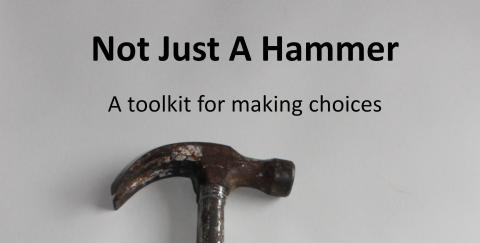Restoring pride in the craft of management consulting
We all want to do work we are proud of. The popularity in the UK of TV shows like the Repair Shop demonstrates the nation’s pleasure of seeing high-performing people using the appropriate tools with skill and precision.
The world of management consulting should be no different.
Pressures of time and workload can push us to constrain the time spent in assessing the problem and designing appropriate approaches. We can then yield to the temptation to save time and effort by using the same tool and approach that worked in the last project.
There is merit and efficiency in such short-circuits, but they are not without risk. Risk that the project team misses something and gets an inferior result but also the risk that craftsmanship slowly dies. If we get out of the habit of questioning whether our default approach is best for this situation inevitably there will come a time when it isn’t, and we may fail to notice it.
A master craftsperson has expertise in a vast range of tools and knows when not to use a particular one but to select a more suitable one instead.
In the context of management consulting, ‘tools’ can refer to such things as frameworks and reference models, core concepts, stories, points of view and quotations.
We can consider 5 foundations of expertise in using tools in the craft of management consulting:
- To recognise that there are multiple ways of doing most things (and that having a number of tools and insights about when to use each one) is something that matters.
- To collect (or have access to) a set of tools.
- To be able to use each tool properly.
- To know when to use each tool. For example, not to use a chisel as a screwdriver. As we get to use each tool properly, we get to recognise the distinctions between approaches, why multiple tools are necessary, and when to use each one.
- For tasks beyond the scope of an individual practitioner: to have a language for describing tools to allow effective collaboration within the team about which to use for what purpose.
This is why I wrote the book ‘Not Just A Hammer’. Its purpose is to establish and strengthen these foundations. In it I present multiple tools and highlight distinctions between them and describe how and when to use each one.
In addition, I provide an instant toolkit of 100 tools in the form of frameworks, core concepts, stories, points of view and quotations. I also present each tool thoughtfully as a concise chapter. I group the tools into general themes, including strategic planning, value, measurement, decision making, organisational design and controls, effective dialogue and the pitfalls of bias and blindness.
I have included plenty of cross-references linking related tools together. My aim was to be both rigorous and practical. Management consultants at any stage of their career will find topics of interest. Perhaps the most value comes when teams of people share the language of the toolset and can collaborate with a common understanding of a shared set of tools.
Reading the book will challenge your own thinking, provide new ways of thinking, and enhance your ability to collaborate with others.
 About the author: Paul Turton’s successful consulting career spans many decades. He is a recognized thought leader. Consistent feedback from those he has worked with has been “you have changed the way I see things, and changed how I think”.
About the author: Paul Turton’s successful consulting career spans many decades. He is a recognized thought leader. Consistent feedback from those he has worked with has been “you have changed the way I see things, and changed how I think”.
Paul has worked in many countries and cultures, across public and private sectors.
***
